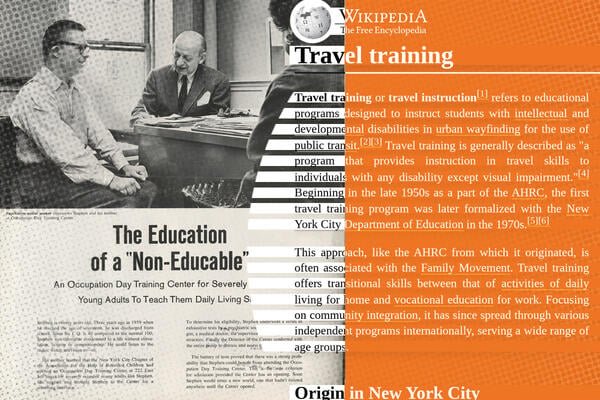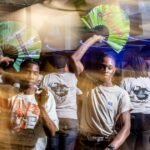Wikipedia Is Giving Academic Resources New Life Online
Until this spring, the story of how New York City launched the first “travel training” program for people with disabilities in the 1970s was nowhere to be found on Wikipedia, the world’s largest free online encyclopedia.
But the program—which was designed to help disabled people navigate public transit—was deeply important to the parents of disabled children, who pushed for it in New York before it proliferated across the country and the globe. That’s something Patrick McGee, an information studies and history graduate student at Queens College, knew from wading through primary and secondary sources about disability advocacy and the travel training program sitting in the stacks of the City University of New York system’s libraries and archives.
“It’s not something that’s well represented on the internet. The story of this program didn’t exist in a very accessible form,” McGee said. “The hope is that by writing an article about travel training, we can make this more widely known as a success. This is a story about a group of teachers and activists who took direct action and worked with—and pushed against—systems in productive ways to create this program.”
As of last month, Wikipedia now contains a lengthy article on travel training that McGee helped write, using—and citing—numerous primary sources in CUNY’s archives as part of an initiative led by Richard Knipel, who started in March as the City University of New York’s first Wikimedian in residence. Knipel, who has previously served as a Wikimedian in residence for the Museum of Modern Art, the Guggenheim Museum and the Metropolitan Museum of Art, is working with faculty, students and staff to incorporate the wide range of expertise and research materials at CUNY into Wikipedia’s easy-to-access online content.
The two-year residency pilot program is a partnership between CUNY and Wikimedia New York City, and funded by Craig Newmark, founder of Craigslist and namesake of CUNY’s journalism school. “Wikipedia is where facts go to live and where truth tellers of all types can contribute to an accurate historical record,” Newmark said in a news release. “A Wikimedian-in-Residence will help CUNY share information available in its archives and the expertise of its faculty with the public.”
To accomplish that goal, Knipel is working closely with CUNY’s information specialists, including university archivist Natalie Milbrodt, who has edited several Wikipedia articles on local history topics. Inside Higher Ed interviewed both Knipel and Milbrodt to hear more about their work and how it can benefit students, faculty and the general public during a time when the information ecosystem is bombarded with misinformation.
(This interview has been edited for length and clarity.)
Q: What is the value of Wikipedia in an era of rampant misinformation and disinformation? How does it benefit from partnering with librarians and archivists?
Knipel: Wikipedia is one of the few places left on the internet where people with different viewpoints, including on politics, can come together and work on something positive. We share all of the facts. We’re not trying to push propaganda. I’m not trying to sell a product. I’m just trying to share as many facts as possible in as much context as possible. And that’s something that you can do on Wikipedia that you can’t do on conventional social media. Trying to share information—that’s their ultimate goal. The most basic difference between Wikipedia and Facebook or X is that Joe Biden does not write the Wikipedia article on Joe Biden and Elon Musk does not write the Wikipedia article on Elon Musk, because it’s written by a broader volunteer community.
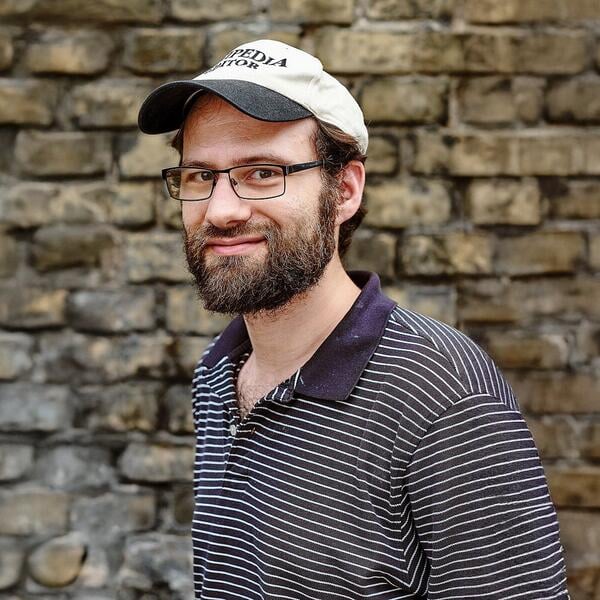
Richard Knipel
We’re the No. 1 nonsense detectives on the internet. We try to see if information is actually backed up by a reliable source. “Can I read it? Does it actually say that? Does it say something different? Are there other sources that contradicted it—you know, what is the overall scholarship in an area? Is this particular source an outlier?” Things like that.
Milbrodt: That’s something librarians and archivists can help with. There will be statements that are flagged that don’t have any kind of citation backing up the fact that has been stated. But an information professional may know that’s true because it’s written in a book. Once they find it, they can add the citation, which strengthens the reliability of the article.
Q: How does housing CUNY’s Wikimedian in residence within the CUNY Office of Library Services help to advance the educational mission of both the library and Wikipedia?
Milbrodt: What makes a lot of sense about Richard being part of our team in the Office of Library Services is that librarians and people who are part of the Wikimedia movement are very aligned in our desire to help people with information literacy. It’s a really core part of being a librarian, especially in a university setting, where you’re helping students who are trying to understand the difference between a good, valid source that they can use for a research paper—or other kinds of research they’re doing—and something that’s not right.
And If you look at any Wikipedia article and you scroll to the bottom of the page, you’re going to see links to reliable sources and a transparent chain of edits that’s happened so you don’t have to wonder who wrote it. All of that is extremely transparent, and that’s great for an open information ecosystem.
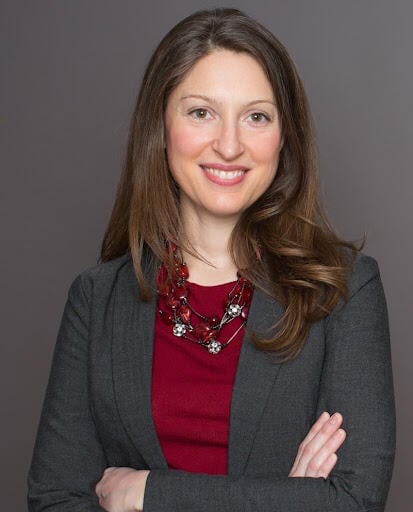
Natalie Milbrodt
Between that, and also making all of the resources that CUNY libraries have to offer even more discoverable on the web, there’s a lot of potential for connecting people with good information online and the many resources that are available for CUNY students, faculty and the general public.
Knipel: Wikipedia provides largely a summary function to the knowledge in the world. And so we try to see, what are the interesting facts out there? What is the scholarship on this topic? And we try to summarize it and reference it properly with proper citations.
For example, in an article about the New York City subway, we want to have the most up-to-date information and that it comes from the right sources—official [Metropolitan Transportation] Authority sources, the right sources that are critical at the MTA and the right historical sources. It’s not just what you might get on social media and the internet writ large.
Q: Do you find that students today struggle to identify reliable information when they’re bombarded with unreliable information?
Milbrodt: Students have struggled with research forever, because it’s really challenging. But there is also a kind of savviness that I’m seeing in the young people that I work with where they don’t just take everything that they read online and assume it’s fact. And I think that little bit of hesitation is actually a big help and something that’s an advantage for them.
Q. Is there a distinct educational advantage to having students research and write Wikipedia articles instead of a traditional term paper or other research assignment?
Knipel: Instead of a term paper, which might be read once by their professor, they can help improve a topic on Wikipedia, which may be read by thousands of people. And it’s a nice educational tool in terms of information literacy, because they’re writing as part of the community. They’re writing in a neutral, nonpersuasive way, which may be different than how they’re used to writing some of their schoolwork—or even social media posts.
It’s also harder to plagiarize when you’re writing for Wikipedia, because they can’t copy from Wikipedia or from ChatGPT. Their contributions are going to be evaluated by other Wikipedians and see that it fits into a larger whole. It helps them see that their work doesn’t exist in isolation, but rather as part of the sort of collaborative community.
Q: Speaking of information ecosystems, what is Wikipedia’s role in large language models, which are trained on information of varying quality and often criticized for not offering citations and “hallucinating” some information?
Knipel: There’s no question that generative AI draws from Wikipedia, and Wikipedia is a large part of what made something like ChatGPT possible—at least when it was first released, Wikipedia was the largest single source that was used for ChatGPT.
Milbrodt: I would also say that this is a role for librarians and archivists and people who are experts on a given topic. We’re feeding the robots, so if we’re feeding them good, reliable information that’s backed up by actual, truthful sources, then that will be in the mix. But if we abstain from that, then what will fill in the void will just be whatever else other people are putting in. This is an opportunity to try to put reliable metadata and historical sources into the record and make them easily discoverable. That’s the most proactive way to improve the quality of information online.
Q: What are the benefits of hosting a Wikimedian in residence at CUNY, which has 25 campuses and one of the largest and most diverse student bodies in the country?
Knipel: It’s good for the student body and it’s good for Wikipedia. We need more perspectives, and we need to share how something like Wikipedia works. We already have a tradition at CUNY LaGuardia doing translate-athons, where people write Wikipedia articles in different languages and help translate between them. And there are a lot of other ways that working across the diverse student body and diverse fields of study can help improve Wikipedia and be useful to the student learning experience as well.
Milbrodt: It also helps Wikipedia because the more people—and the more diverse those people are—who are looking up topics that they believe should have articles, the better. Maybe they’ll search for something and see there’s no article about it, or there’s only a minimal stub article about this topic, and decide it should be represented on Wikipedia. No one individual is going to ever know all of the things that are important enough to have representation on Wikipedia.
You may be interested
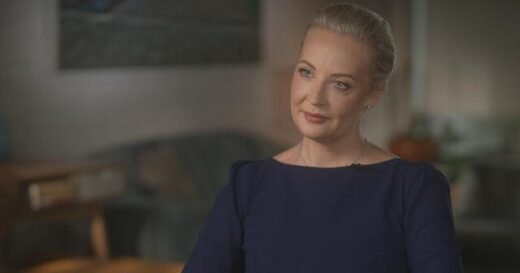
Yulia Navalnaya, widow of Alexei Navalny, continues fight against Putin | 60 Minutes
new admin - Jun 23, 2025Yulia Navalnaya, widow of Alexei Navalny, continues fight against Putin | 60 Minutes - CBS News Watch CBS News Yulia…
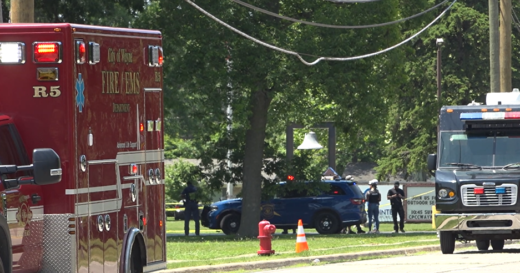
1 injured, suspect dead after shooting at church in Wayne
new admin - Jun 23, 2025One person was shot at a church in Wayne, Michigan, on Sunday morning and an alleged gunman was killed following…

‘Masterpiece’ 90s movie with 91% Rotten Tomatoes score now on Netflix UK | Films | Entertainment
new admin - Jun 23, 2025Netflix UK has added a 90s classic that launched the career of a hugely recognisable Hollywood actor. The streaming service…







